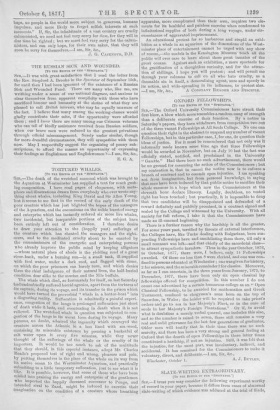OXFORD FELLOWSHIPS.
[To THE EDITOR OF THE " srsonzon."] Sin,—The Oxford University Commissioners have struck their first blow, a blow which more resembles a random essay of strength than a deliberate exercise of their function. By a notice in Saturday's papers, they have withdrawn from competition two out of the three vacant Fellowships at All Souls College. No one can question their right in the abstract to suspend any number of vacant Fellowships, but in this particular case, I, for one, do question their ideas of justice. For it must be remembered that not only was it informally made known some time ago that three Fellowships would be awarded in November, but on July 10 last the fact was officially stated, notified, and proclaimed in the University "Gazette." Had there been no such advertisement, there would be no ground for censuring the action of the Commissioners ; but my contention is, that to cancel the notice now is to enforce a breach of contract and to commit open injustice. I am speaking Hot from imagination, but from personal knowledge, in saying that men have been induced by that public notice to sacrifice their whole summer in a hope which now the Commissioners at the eleventh hour declare illusory. Legally, doubtless, no vested right has been touched ; but practically, it is impossible to deny that two candidates will be disappointed and defrauded of a reward definitely and publicly promised, in a contract signed and sealed by the College and witnessed by the University. With all anxiety for full reform, I take it that the Commissioners have made an ill-omened beginning.
There is a further reason why the hardship is all the greater. For some years past, terrified by threats of external interference, the Colleges have, like Turks dealing with Bulgarians, been sus- pending Fellowships here and annihilating them there, till only a small remnant was left—and that chiefly of the sacerdotal class— to attract sympathetic invaders. Thus in the year October, 1876, to October, 1877, there were, I believe, only 14 Fellowships awarded. Of these no less than 8 were clerical, and one was con- fined to persons educated at Winchester ; one was given for history, 2 for science, and the miserableremainder 2 for classics. Moreover, as far as I can ascertain, in the three years from January, 1875, to December, 1877, there have been only six open classical lay fellowships offered for competition. In this number I do not count one advertised by a certain humorous college as an "Open Classical Fellowship, to be awarded for mathematics and Greek Testament, confined to clergymen's sons born on the top of Snowdon, in Wales ; the holder will be required to take priest's orders and go to sea in her Majesty's Fleet, or to the cure of souls in her Majesty's Foreign Plantations." Or if, to avoid what is doubtless a merely verbal quarrel, one includes this also, and so the number is raised to seven, there still remains a very real and solid grievance for the last few generations of graduatea. Older men will testify that in their time there was no such scarcity, and there has been a very strong and general feeling at Oxford that the dearth of open Fellowships in these latter times constituted a hardship, if not an injustice. Still, it was felt that the injustice, for the most part, was involuntary, indirect, and accidental. It has remained for the Commissioners to make it voluntary, direct, and deliberato.—I am, Sir, &c.,


































 Previous page
Previous page